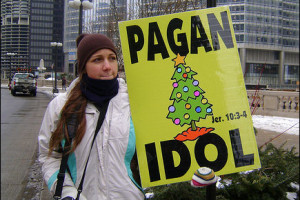In keeping with the Christmas spirit that has been permeated the blog, I thought I would attempt to meld my two-kingdom series with something relevant for the holiday season. In the secularized west, the constant debate about Christ’s relationship to Christmas provides a fantastic peek into the practicality of the two kingdom’s discussion.
Today’s article takes us to a small Texas town in Henderson county called Athens. I ran across a most curious article about the town this past week. There is a big battle going on in the town right now. It’s not a battle fought with guns or knives or swords. Rather, it is a religious battle. A group of Wisconsin atheists who are affiliated with the Freedom From Religion Foundation (hereafter the FFRF) have demanded that the county courthouse remove their nativity scene which is nestled nicely on the front lawn. For most people in Athens, the nativity scene has been around for as long as they can remember. Now this certainly isn’t the first battle of this nature that has occurred in this country, nor will it be the last. Most Christians are eager to defend the putting out of nativity scenes or Christian messages on state property.
I do not share this perspective. Rather, I am eager to defend the atheists. Before you go choking on your Christmas dinner, please hear me out. I don’t defend the atheists on the same ground (I think their reasoning is quite ridiculous) but I think if the atheists accomplished what they wanted, it would be a victory for the Gospel.
Those that stridently defend the state putting up nativity scenes come from a certain theological perspective, one-kingdom theology, that drives their response to the atheist attack. The strains of one-kingdom thinking are littered throughout the article. I want to pull a couple of those strands out and point to some problems with the reasoning.
At one point in the article pastor Nathan Lorick of First Baptist Church in Malakoff Texas says, “Christianity is under attack in America. Our country is quickly heading down a direction which the Christian is taking a hit—it’s quickly becoming suppressed.” This type of rhetoric is common for many one-kingdom thinkers. What they mean when they say this is that Christianity is being removed from civil institutions by the secularists and hence it is being attacked. This statement really isn’t that problematic. Yes Christianity is being attacked by being removed from state institutions but what pastor Lorick and other one kingdom thinkers don’t seem interested in addressing is whether Christianity should ever “reside” in state institutions in the first place.
Some will immediately object here and say that my reasoning is fallacious because if the statement doesn’t stand for anything, then they are making a stand for nothing. This objection is not valid and I will explain why.
I have not been shy about the fact that I agree with the two-kingdoms framework. But the two-kingdoms framework does not demand a secularized society. Nor does it demand a Christian society. In fact, it demands neither. Two-kingdom’s thought has always argued that part of the natural law corpus (the standard by which civil society should be governed) contains a concept of the fear of God. The fear of God is something all men feel in their conscience whether they acknowledge it or not. One of the best examples of this fear of God is found in Genesis 20. This is the story of Abraham and Abimelech. In the story, Abraham is traveling in Gerar. Out of fear losing his own life at the hand of the king in order that he—the king—might take Sarah as his own wife, Abraham declares, “She is my sister” (Gen. 20:2). Abimelech subsequently takes Sarah as his wife. Upon God revealing to him in a dream that Sarah is actually Abraham’s wife he promptly returns her to Abraham and confronts his lie. He asks Abraham, “What have you to us? And how have I sinned against you, that you have brought on me and my kingdom a great sin? You have done to me things that ought not to be done” (Gen 20:9). Abraham goes on to reply, “I did it because I thought there is no fear of god at all in this place…” At its core, Abraham’s suggestion is an acknowledgment that the fear of God exists in a society that has been untouched by the still fledgling covenant community. With the return of Sarah, Abraham reverses his opinion and agrees there must be a fear of God in this people.
Here is where pastor Lorick errs: He has gone beyond what was intended for the state to uphold (a basic fear of God like that in pagan Abimelech) and asked it to “proclaim” the specific revelatory message of Christianity. This slight nuance is perhaps the single most heinous error in Christian one-kingdom dogma. The article’s writer goes on to state that Lorick, “wants his children to grow up in the same country that had the religious freedom and opportunity to ‘worship Jesus as I did.’” This is fine and I agree. I want the same for my children. But he is also confusing here the private practice of religion and the state owning a particular religious stance. The state is to uphold that which is naturally revealed to all men in the nature of things. One of those things is a basic belief in God.
Here too, another question has to be addressed and that is this line of reasoning that genuinely believes that America was built on Christianity. I think it is generally disingenuous to label someone as a historical revisionist. Any good understanding of history and epistemology will tell you that though there is one truth, history is multi-perspectival. And this perspectival lens on history is what leaves room for discussion and debate. But when the evangelical one-kingdom thinkers see reference to God in any sort of state creed, document or otherwise, they immediately paint over it with images of Christianity. This is so far removed from the historical uses of “God” in these various items as to be largely misleading; to put it charitably.
This type of thinking has far reaching theological ramifications. Those who agree with Pastor Lorick see it as an essential Christian thing to stand up against the removal of the gospel message from state institutions. These activities are contrary to what God intended for the state, like I have argued over the past couple weeks. But this isn’t just a matter of civil society but it is equally a matter of ecclesiology. The purpose of Christ’s church is to bring the gospel of Jesus Christ to a depraved humanity. This is where church ought to focus their efforts. Not on maintaining so some sort of modern distorted Christendom. Less time spent trying to put Christ into the state and more time spent bringing the gospel to the world through bold proclamation.
Pastor Lorick states at the end of the article, “We cannot sit by. It’s a hill to die on. It’s a fight worth having.”
I beg to differ.





3 Comments
Leave your reply.